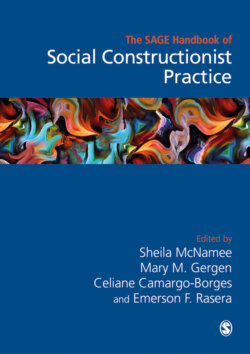Читать книгу The Sage Handbook of Social Constructionist Practice - Группа авторов - Страница 70
На сайте Литреса книга снята с продажи.
Social Means Building on Legacy
ОглавлениеAction research can begin anywhere – in any context in which we find ourselves as facilitators, and or as leaders, and/or as participants in the systems that require change. We can't do action research if there are no stakeholders to the inquiry. Engaging others is the most important, and often most difficult, work. To return to the case above, I wondered about next steps, and next key stakeholders, after the Dundee conference. An immediate group to engage was the other associate editors of the journal in which the special issue on climate transformations was published. What if the special issue was not just a once off?
I know from my own experience that no one embraces transformation easily (including me). I started the conversations with my fellow associate editors by stressing how a potential change process – whereby the journal would support more action research for transformations – is also in continuity with what we have accomplished before.
As a journal we were well positioned to embrace a refreshment of our mission. Our journal experiences an over-supply of good articles. I knew that each associate editor had individual career and personal goals, and so I inquired with them how a shift in emphasis to embrace sustainability in our mission, and with it a vision for regenerative society, could be of value to them and to us as a whole board.
Not everyone is equally familiar with the notion of sustainability. To bring clarity we agreed that the SDG's (The UN Sustainable Development Goals) supply a concrete, if imperfect vision of a regenerative world. We agreed that the SDGs supply a concrete, if imperfect, vision of a regenerative world.
The emphasis on refreshing our mission at the journal felt like a step toward joining the many poly-centric, poly-vocal efforts within our larger societal shift to embrace better knowledge-creation processes in search of a life sustaining society. These are fed in particular today by the Global South and non-Western perspectives on diverse forms of knowledge beyond Cartesian colonialism. The action research tradition brings decades of experience, and a commitment to learning with others – a recipe for naturally transforming with the times.
While it is unlikely that conventionally trained scientists will leap to practice action research, we agreed as a board that we can and ought to partner more to mutual benefit with those conventionally trained scientists who are interested in impact. In turn, our gift to our stakeholders, i.e., the scholar-practitioners who want to do things differently, who want to be part of the solution, and who see ethics as part of scholarship, is to offer an oasis, a community of inquiry/practice, in an otherwise arid world of objectivist-objectivizing research.
